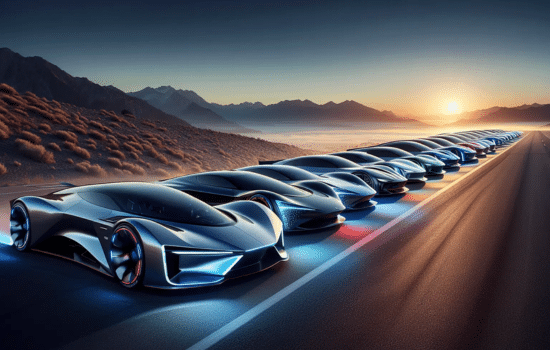Advertisements
In a world where energy efficiency has become a priority, the search for vehicles that combine speed, luxury and low fuel consumption is increasingly relevant.
Supercars, known for their power and impressive design, are no exception to this trend. As technologies advance, manufacturers have managed to innovate, presenting models that not only conquer the tracks, but also offer surprising fuel efficiency.
Advertisements
This article explores an exclusive selection of ten supercars that redefine what it means to be energy efficient.
These vehicles are not only a testament to ingenuity and advanced engineering, but also reflect a growing trend toward sustainability in the automotive industry.
Advertisements
From hybrids to fully electric models, the supercars featured on this list are designed to deliver exceptional performance while minimizing their environmental impact.
Each model has been evaluated not only for its fuel efficiency, but also for its ability to deliver an unparalleled driving experience.
With innovations ranging from cutting-edge engines to ultra-light materials, these vehicles prove that it is possible to enjoy adrenaline and speed without compromising efficiency.
See also:
- Top 10 Eco-Efficient Cars
- Master the accordion with our app
- Turkish Novels in Your HandLive!
- Top 10 eco-efficient cars: Save money!
- Master the guitar with our app
Technological Innovations in Efficient Supercars
Supercars have traditionally been synonymous with speed and luxury, but with the advancement of technology and the growing focus on sustainability, many manufacturers have begun to focus on fuel efficiency without compromising on performance.
The latest models combine advanced hybrid engines and aerodynamic design to maximize the distance they can travel per liter of fuel.
Not only is this approach beneficial for the environment, it also represents a new era for car enthusiasts seeking both power and environmental responsibility.
A prominent example of this trend is the integration of electric motors into the powertrain of these vehicles.
Not only does this allow for a quieter and more efficient ride, it also provides impressive acceleration.
Plug-in hybrid technology, in particular, is becoming increasingly popular in the supercar market, allowing drivers to choose when to use electric power and when to take advantage of the internal combustion engine.
In addition, the use of lightweight and strong materials, such as carbon fiber, in the construction of the body and chassis, helps to reduce the overall weight of the vehicle, thus improving its fuel efficiency.
Aerodynamics also play a crucial role, with innovative designs that minimise wind resistance and allow for greater energy savings.
In this context, modern supercars stand out not only for their performance, but also for their ability to take us further with fewer resources.
Top Efficient Supercars: Featured Models
One of the most renowned supercars for its efficiency is the McLaren P1, which combines a V8 engine with an electric motor to deliver incredible power output without sacrificing fuel efficiency.
This model is a testament to how hybrid technology can be effectively implemented in high-performance supercars.
Another notable model is the Porsche 918 Spyder, which also uses a plug-in hybrid system. This vehicle has been designed to provide a perfect balance between power and efficiency, allowing drivers to experience the thrill of a supercar with a reduced environmental impact.
Its electric motor allows for short journeys in fully electric mode, which is ideal for city driving.
The Ferrari LaFerrari, while known for its exceptional performance, also makes use of hybrid technology to improve its fuel efficiency.
This approach not only reduces gasoline consumption, but also increases performance by providing instant additional torque through the electric motor.
These models, among others, demonstrate that it is possible to enjoy a supercar without compromising on energy efficiency.
The Importance of Fuel Efficiency in Supercars
The growing demand for more efficient vehicles has led supercar manufacturers to rethink their design strategies.
Fuel efficiency is not only crucial to reducing carbon emissions, but also meets the expectations of an increasingly sustainability-conscious market.
Supercar drivers are beginning to value not just speed and luxury, but also their vehicle's ability to operate more sustainably.
Furthermore, with rising fuel prices, efficiency has become an important economic factor.
Supercar owners are now looking for vehicles that offer better mileage per gallon of gasoline, which can translate into significant savings over time.
The ability to travel greater distances on less fuel is not only a boon to the wallet, but also reflects a shift in the perception of automotive luxury.
Key Technologies in Supercar Efficiency
One of the key technologies that has driven efficiency in supercars is electrification. Electric motors are inherently more efficient than internal combustion engines, meaning they can convert a greater proportion of stored energy into motion.
By combining electric motors with gasoline engines in hybrid configurations, supercars can take advantage of the benefits of both systems.
Additionally, advances in lithium-ion batteries have made it possible to store more energy in less space, which is crucial for supercars where space and weight are critical considerations.
These batteries are essential to allow supercars to operate in pure electric mode for longer periods, thereby reducing fuel consumption in urban situations.
Another key technology is the regenerative braking system, which captures energy that would otherwise be lost during braking and stores it for later use.
This system not only improves fuel efficiency, but also reduces wear on the braking system, prolonging the life of the vehicle's components.
These innovations are redefining what it means to be a supercar in the 21st century, combining performance, luxury and ecological responsibility in an unprecedented way.
Challenges and Opportunities for Efficient Supercars
Despite significant advances in efficient supercar technology, there are still challenges that need to be addressed. One of the main challenges is cost.
The implementation of advanced technologies, such as hybrid engines and lightweight composite materials, often comes at a high cost, which can make these vehicles inaccessible to many consumers.
However, as these technologies become more common, costs are expected to drop, making efficient supercars more affordable.
Furthermore, continued development in battery and electrical system technology promises to further improve the efficiency and reduce the price of these vehicles in the future.
On the other hand, increasingly strict environmental regulations are pushing supercar manufacturers to continuously innovate.
This presents an opportunity for brands to stand out in the market by offering models that not only comply with regulations, but also lead the way towards a more sustainable future.
The transition to more efficient supercars is not only a response to market demands, but also an opportunity to redefine excellence in automotive performance.
The Future of Efficient Supercars
The future of efficient supercars is promising, with trends pointing towards greater integration of clean and sustainable technologies.
Full electrification is a real possibility, with brands like Tesla leading the way in developing high-performance electric vehicles that challenge the conventions of what a supercar can be.
Research into alternative fuels, such as hydrogen, is also gaining ground. These fuels have the potential to offer even greater efficiency and a near-zero carbon footprint.
Developing infrastructure for these alternative fuels will be key to their widespread adoption in the supercar market.
Ultimately, the evolution of artificial intelligence and autonomous driving could completely transform the supercar driving experience, improving not only fuel efficiency but also driver safety and comfort.
In short, the commitment to fuel efficiency in supercars is a trend that is here to stay, promising a future where performance and sustainability go hand in hand.

Conclusion
In conclusion, the era of efficient supercars has arrived, marking a significant milestone in the automotive industry by combining luxury, speed and environmental responsibility.
By integrating advanced technologies such as hybridization and the use of lightweight materials, these vehicles not only offer impressive performance but also minimize environmental impact.
Models such as the McLaren P1, the Porsche 918 Spyder and the Ferrari LaFerrari are outstanding examples of how it is possible to combine power and efficiency without compromising either.
Furthermore, the focus on fuel efficiency responds not only to increasing environmental regulations, but also to the expectations of a more conscious and demanding market.
Efficient supercars not only satisfy the desire for luxury and speed, but also offer an attractive economic proposition in times of rising fuel prices.
The transition towards more sustainable mobility is redefining what it means to be a supercar in the 21st century.
Looking ahead, the trend towards full electrification and the use of alternative fuels promises to revolutionise the sector even further.
Combining these innovations with emerging technologies such as artificial intelligence ensures that the supercars of tomorrow will not only be faster and more attractive, but also more responsible and efficient.
This evolution ensures a future where performance and sustainability go hand in hand, offering a longer journey with less fuel.




